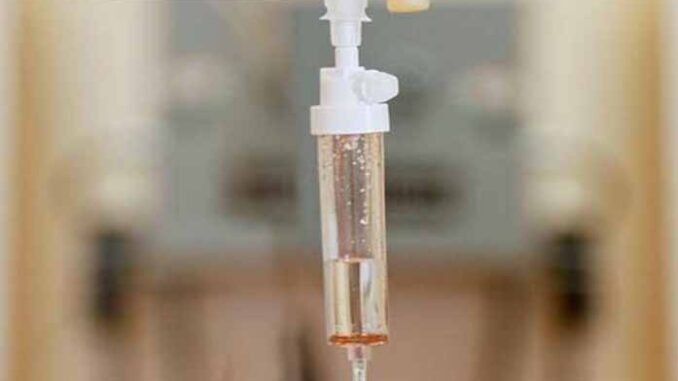
The U.S. Department of Health and Human Services (HHS) recently released a video to health care providers emphasizing the A-rating issued for monoclonal antibody therapies which are intended to keep people with mild to moderate COVID-19 symptoms from requiring hospitalization.
Yet while the attention last week was focused on how many hospital beds are available in Arizona, there was no mention of the difficulty many patients experience getting the highly touted monoclonal antibody therapy in Arizona. This, despite the fact Gov. Doug Ducey provided $60 million to hospitals and other health care providers in September, in part to promote the use of the treatment.
Monoclonal antibodies are made in a laboratory to fight a particular infection—in this case, SARS-CoV-2. The rating from the National Institutes of Health stresses the important role a monoclonal antibody therapy (mAb) can play in reducing the risk that someone infected with COVID-19 will get sicker, said Dr. Rachel Levine, Assistant Secretary for HHS.
The U.S. Food and Drug Administration has given Emergency Use Authorization (EUA) for three monoclonal antibody therapies for patients who test positive for COVID-19, have mild-to-moderate symptoms for no more than 10 days, and are high risk for progressing to hospitalization or severe COVID-19.
The therapy, which is administered by subcutaneous injection or an intravenous infusion, is designed to block the COVID-19 virus from attaching to and entering human cells, thus decreasing a person’s viral load. When provided in accordance with FDA eligibility criteria, NIH data shows 97 percent of people who receive a monoclonal antibody therapy stay out of the hospital.
“Used early, monoclonal antibodies provide COVID-19 patients with a boost that can help keep COVID-19 from putting them in the hospital — or worse,” according to Jennifer Rigler, an Assistant Director for the Arizona Department of Health Services. “That makes this treatment especially helpful to people at high risk for severe complications of COVID-19.”
Currently there are two COVID-19 early treatment monoclonal antibody therapies for eligible patients who are 12 years and older. A third therapy had its EUA expanded by the FDA on Dec. 3 for use with all eligible patients, including newborns and young children.
In addition, two of the therapies have FDA authorization as a prophylaxis for eligible individuals who have been exposed to a COVID-19 positive person. The treatment, however, should be received within 96 hours of exposure, according to HHS.
When Gov. Ducey announced the $60 million funding for addressing health care staffing challenges due to COVID-19, his office noted that expanded use of monoclonal antibody treatment “will help decrease the rate of hospitalizations and help alleviate pressure on hospitals and staff.” However, the Arizona Department of Health provides no data on its COVID-19 website about how many treatments are being administered.
What is known is that some Arizonans are finding it quite challenging to arrange for the therapy. First, the FDA only allows the infusion treatment to be administered by health care providers who have immediate access to medications to treat a severe infusion reaction, such as anaphylaxis, and who have the ability to activate the emergency medical system (EMS).
Second, a referral from a physician or approved nurse practitioner is necessary for eligible patients to obtain the COVID-19 monoclonal antibody therapy. Most primary care providers are leaving it up to patients to contact the U.S. Department of Health and Human Services’ Combat COVID call center to review a patient’s eligibility.
If deemed eligible, someone at the HHS call center will provide the patient a list of locations within 100 miles believed to have the age-appropriate therapy available. This list is then relayed by the patient to the patient’s primary care provider, who in turn must prepare a written or electronic referral for a specific therapy at a specific treatment location.
But whether the prescribed therapy is available by the time the referral received so the patient can schedule an appointment is not guaranteed. In addition, there have been issues for patients in rural areas with finding a location within a reasonable distance.
As of Saturday, the National Infusion Center Locator showed the only verified medical facilities within 100 miles of Yuma were in southeast California. On the other side of the state, only four verified medical facilities were listed within 100 miles of Benson.
Making it further difficult is that some medical facilities may have one or more of the approved treatments, but the facility does not show up on the Locator website due to being a secondary distribution site or a pop-up facility that is not listed, according to the National Infusion Center,.
The National Infusion Center website even states it is necessary to directly contact a medical facility to confirm an antibody therapy is available “as the COVID-19 landscape continues to rapidly evolve, and this includes those centers that administer the therapies”
A fourth monoclonal antibody therapy is available for patients hospitalized with severe COVID-19 symptoms.
For those who have COVID-19 symptoms but not a health care provider, the HHS Combat COVID Monoclonal Antibodies Call Center may be able to help. Call 1-877-332-6585 (English) or 1-877-366-0310 (Spanish).
